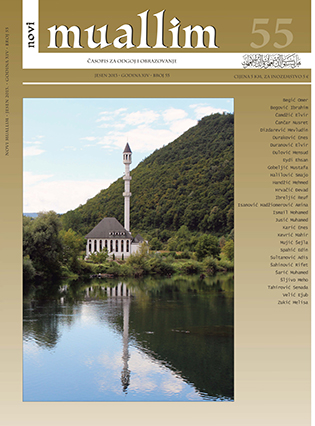ISLAMIC RELIGIOUS EDUCATION IN BOSNIA AND HERZEGOVINA IN PERIOD BETWEEN 1945 AND 1990
POLITIČKI I PRAVNI KONTEKST INSTITUCIONALIZACIJE VJERSKOG POUČAVANJA
DOI:
https://doi.org/10.26340/muallim.v14i55.308Keywords:
Islamic religious education, Bosnia and Herzegovina, World War IIAbstract
After the end of World War II, Bosnia and Herzegovina, and therefore the Islamic Community found itself in a new constitutional order and under circumstances which brought with them new challenges for the Islamic Community. Maktab classes represented one aspect of the educational activities of the Islamic Community consisting of elementary religious education of Muslim children. Maktab education went through a series of different structural changes in previous periods and political systems, but since the Ottoman rule until 1952, maktabs existed as independent religious education institutions, where the teaching process was carried out by qualified educators. After 1952, maktab classes were completely transferred to the facilities of mosques and masjids, and today they still exist in this form. This paper provides an overview of different events related to religious education in context of circumstances under which the Islamic Community operated between 1945 and 1990. The aim was to present the conditional transformation of religious education’s organization which was imposed by the social and political circumstances of the period.
Downloads
Published
How to Cite
Issue
Section
License
Naknada:
a. Časopis ne naplaćuje naknadu za obradu članaka (APC) i naknadu za podnošenje članaka.
Autori koji objavljuju u ovom časopisu pristaju na sljedeće uvijete:
- Autori zadržavaju autorska prava i pružaju časopisu pravo prvog objavljivanja, pri čemu će rad jednu godinu po objavljivanju biti podložan licenci Creative Commons imenovanje koja omogućuje drugima da dijele rad uz uvijet navođenja autorstva i izvornog objavljivanja u ovom časopisu.
- Autori mogu izraditi zasebne, ugovorne aranžmane za ne-ekskluzivnu distribuciju rada objavljenog u časopisu (npr. postavljanje u institucionalni repozitorij ili objavljivanje u knjizi), uz navođenje da je rad izvorno objavljen u ovom časopisu.


